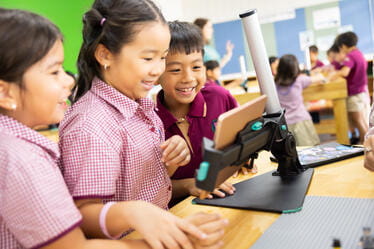NAE STEAM Festival 2019 This year the Nord Anglia Education South East Asia STEAM Festival was held at Regents International School in Pattaya and for 6 of our students it was an amazing journey of collaboration, critical thinking and creativity.
This year the Nord Anglia Education South East Asia STEAM Festival was held at Regents International School in Pattaya and for 6 of our students it was an amazing journey of collaboration, critical thinking and creativity.
STEAM (Science, Technology, Engineering, Art and Mathematics) is more than just the sum of the subjects that make up its name and is an approach to learning that incorporates many different learning areas in cross-curricular and project-based learning experiences. The skills that are developed in STEAM are integral for the world that we are moving towards and the problems that we are facing; climate change being a great example. Our collaboration with MIT allows us access to resources, people and professors at MIT and this connection is providing unique opportunities for our students to develop their understanding of STEAM and the way it can enhance their learning.
This year the Nord Anglia South East Asia and Middle East STEAM Festival was held in Thailand at Regents International School and six students from across years 6, 7 and 8 made up our STEAM Team for the festival joining 120 students from 16 other Nord Anglia schools.
The students were split into groups with peers from other schools and then given the challenge to continue the work of MIT Professor Allan Adams from the MIT Future Oceans Lab. They were tasked with creating a device to capture images from environments around the world (and beyond) that have been difficult to access. Students had researched their environments prior to the festival and presented their findings to their group. Each group then selected one of the environments to explore further and they spent the next two days prototyping their designs and creating models.
Groups selected environments such as the Mariana Trench, the surface of Mars and inside an active volcano. They had access to Computer teachers, Art teachers, Mathematics teachers, Science teachers, Design Teachers and STEAM Specialists from all over the region. One of the key elements of the project was to choose resources carefully, so they had a limited amount of STEAM Tokens that they could use to purchase resources and advice. Students recreated their environments in augmented and virtual reality so the judges were able to put on VR headsets and be in the Bermuda Triangle or hold an AR version of a Mars Drone in their hands. Students set themselves challenges, got stuck, struggled then persevered through the problem until they reached a solution. They chose resources that they did not know how to use, like Arduino Micro Processors or laser cutters or 3D printers, and then set about how to learn the skills and application of the technology in a realistic setting.
At the end of the second day, there was an expo of the 20 different group projects. Students described their research, presented their models and critically explained the reasoning behind every choice that they had made. Our students were the perfect ambassadors for the British International School Ho Chi Minh City in the way that they accepted the challenge, pushed themselves and encouraged their peers. They embodied the Aide Memoire - Global citizens, learning together.
Luke Dyer, STEAM Co-ordinator








